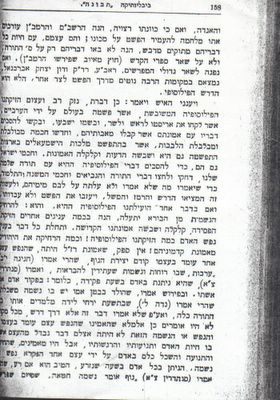(The Author is speaking): ... Behold, the Rashbam and Ramban waged war to place peshat in its {rightful} place; and they themselves, though all their words are sweeter than honey, behold their words only come on the books of the Torah, but not on the rest of the holy books {=Nach} (except for Iyyov which the Ramban explained). And if we turn to the rest of the great commentators -- Ibn Ezra, Radak, and Abarbanel -- we find that in many places they divert from the peshat to another side - is this not the philosophic derash.This actually somewhat accords with the third category of the Rambam in terms of midrashic literalism - that if a statement by Chazal does not work with the sechel and the emet. I did not get to translating the Rambam in full, but compare the Hebrew of Shadal with the following statement of the Rambam (towards the end):
And the man {=his guest, but Shadal is really writing both sides of the discussion} replied to me and said: You have spoken correctly. A great and grievous damage has the mixed up philosophy damaged us -- which spread in the world via the Arabs, who took Aristotle as head and chief, and in his name they swear, and they wish to make his words agree with their beliefs which they received from their fathers, and they innovated a confused wisdom which confuses the hearts - which when the kingdom of Ishmael spread in the lands, this (ideology) also spread, and confused the de'ot and ruined the beliefs.
And the chachmei yisrael also, in order to make the words of this philosophy agree with our Complete Torah, forced and pressed the words of the Torah, Nevi`im, and the chachamim of the Mishna and the Talmud in order that they say what they did not say and never entered their hearts in {all} their days. And in order to do this they {the chachmei yisrael} brought out the {tools of} derash, remez and mashal {allegory}. And they abandoned the peshat and did not serve it....

Again, my problem with this approach is brought out well by Shadal's words. If we allegorize where Chazal never intended allegory, we transform Chazal's words into what they were never intended to mean, just to make it accord with our own philosophical beliefs.
Now, one might argue that Shadal felt that Aristotelean philosophy was falsehood (and in fact it is falsehood), and so allegorizing pesukim, mishnayot and gemaras was moving away from the truth. But nowadays, we know the truth, in the form of modern science, and so we are moving towards truth. Of course, those perpetrating the allegory - the derash haphilosphy in Shadal's days and before also thought they knew the truth.
Conversely, Shadal might not feel the same way about modern science which he might have felt was truth. That is applying the same approach to something that actually is truth would not be in keeping with Shadal
On the other hand, as I have pointed out elsewhere, the social and intellect inputs to Josh Waxman are not the same as the social and intellectual inputs to the authors of various midrashim, and so just because I do not find something plausible does not mean that it was inplausible in the midrashic author's milieu. Declaring that the authorial intent was allegorical just because I disagree with a midrash on a historical level may well be forcing the words of the chachamim in order that they say what they did not say and never entered their hearts in all their days.
I do believe that many midrashim are allegorical, but that we must take care in identifying them rather than just labelling any midrash we disagree with as allegorical.
(Of course, this citation from Shadal does not necessarily touch on the issue of whether and which midrashim are allegorical, just on the issue of reinterpreting sources to fit your worldview.)
Here again, is Shadal.


No comments:
Post a Comment